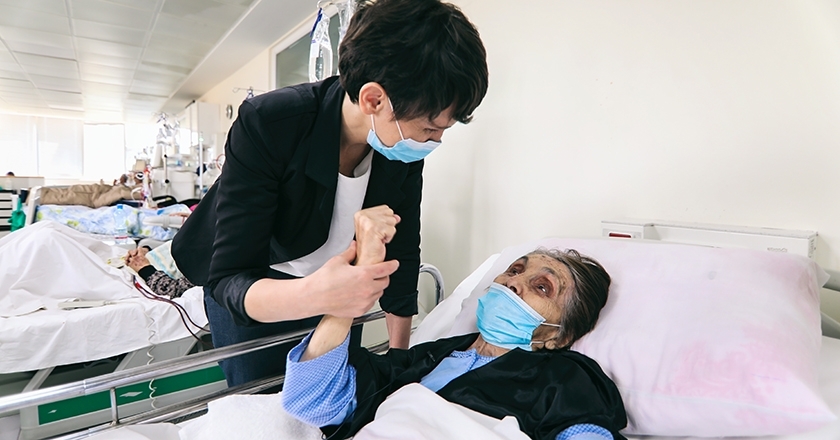Zaira Parjiani, 76, has spent her entire life in Latali. In May, the analysis showed none of her kidneys work, and she will die without dialysis. She should make a tough choice – leave Svaneti and move to Tbilisian Yard with her daughter. Initially, she refused; she would rather die near her native mountains and her daughter’s grave. The family somehow managed to change her mind, and since May, she has been a patient of Ingorokva clinic nephrology center. She needs hemodialysis every Tuesday, Thursday, and Saturday.
Zaira could visit her daughter’s grave neither on Dormition of the Mother of God nor on Easter. Travel time from Tbilisi to Mestia is eight hours. This trip is almost impossible without skipping a session, making it a life-threatening risk.
She was unusually nervous on October 29. Sixteen years after her daughter’s death, this was the first time when she could not mourn on the grave. It caused a stroke. Doctors saved her, but she partially lost speech.
„Mom owns a large yard in Svaneti. Here, all she can see in the yard are grey walls. She never told me anything, but I feel it. She sits and watches rare sunbeams. I ask her to do stuff she enjoys. She knits socks, planted a Svanetian apple in a pot. She wants to feel like there, but you see yourself, Svaneti, and this place have nothing in common. If Svaneti is shown on TV, she stands up, gets close, and touches the screen like a child. We sit in silence and watch her“ - after the stroke, doctors advised Maia to tell her something joyful to her mother. She promised her to do anything possible to open a dialysis center in Svaneti in the summer.
Maia addressed the Minister of health by asking why patients are forced to relocate to get treatment. But, unfortunately, she did not receive the answer.
The closest clinic to Svaneti, equipped to perform hemodialysis procedure is in Zugdidi, 140 kilometers away from Mestia. It is a 3-hour-long trip, even longer in winter due to snow and frozen surface. There is no municipal transportation in Upper Svaneti, and taxis cost 150 GEL.
Zaza Shukvani, 52, relocated from Lenjeri to Vaziani, close to Tbilisi with her family. He needs hemodialysis three times a week as well. The road between Vaziani and Ingorokva clinic is 80 kilometers. Zaza needs four different busses to get there and return home.
„I’m struggling here, but at least I’m alive,“ – Zaza tries to console her mother and sister, who stayed in Svaneti to take care of their house and their ancestor’s graves. They speak with each other via Facebook every night.
Zaza: If there were an option other than going to Zugdidi, I would not even consider coming here. After the session, even returning to Vaziani is a struggle. I feel like I have to spend my remaining time on the road.
Mother: It’s impossible to go to Zugdidi three times a week.
Zaza: Of course. You know, guys skipped several sessions and are not alive anymore.
Mother: That is why I don’t want you to come here. Even an hour spent with you means a lot for me, but…
The state finances kidney transplantation as well as the dialysis procedure. Her sister gave Zaza a kidney. After the successful surgery, he was permitted to return to Svaneti, but his newly transplanted kidney was surgically removed due to later complications. Now his life depends on dialysis.
Daniel Udesiani, 55, resident of Lenjeri, could not relocate to Tbilisi. He used to go to Zugdidi three times a week. During the pandemic, public transit stopped, and visits became harder to manage.
„He was on dialysis for ten years. Every second morning he used to wake up at 6 am to find someone going to Zugdidi. After a four-hour-long session going the same distance back is hard even for healthy people. Sometimes no cars were coming from Zugdidi, and he was forced to stay there. In February, the transit was prohibited due to the pandemic; we could not afford to rent private transportation, and he missed several sessions. Often he would go there with only 2 Laris in his pocket. He was so tired of traveling in recent years; I almost forced him not to stop. He used to tell me:
„Leave me alone, I will die soon, and we both will rest.“ – Asmat Kordzaia recalls numerous meetings between her late husband and deputy to parliament, mayor of Mestia. He even saw a dialysis machine that had not been turned on for years.
„They say nephrologists demand a high salary to work here. He was hoping that machines would make our lives easier financially and physically. All I want now is for everyone to avoid what tortured me for those ten years.
People living in upper villages are even in worse conditions. Residents of Ushguli, Kala, Mulakhi, and other villages should first go to Mestia and then find a car going to Zugdidi to arrive there before 1 pm. After a four-hour-long session returning to Mestia and then in villages again is impossible. We met with people who feel they may have kidney issues but refuse to perform analysis as they cannot get treatment in Svaneti.
Tengiz Chartolani, a director of Mestia hospital, knows how dialysis patients struggle. However, they do not have even one qualified nephrologist there.
There are no official statistics of people dependent on dialysis in Svaneti. In Mestia hospital, kidney analyses are not performed.
According to the information „Mtis Ambebi“ gathered, 17 people relocated from Upper Svaneti receive dialysis sessions in Tbilisi.
The national dialysis program in Georgia started in 1996. The yearly budget of the program was 53 650 000 GEL in 2021. 3400 people participate in the program.






